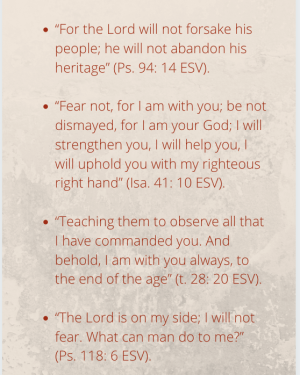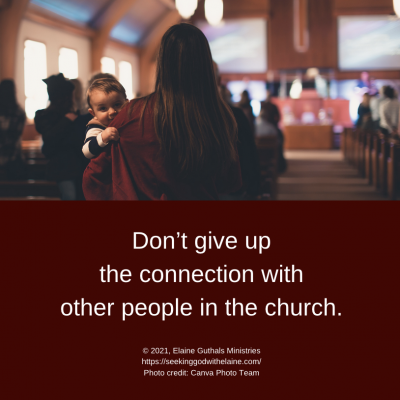It is easier to stand firm in trials when your family encourages you. In this daily devotional how Paul encouraged the Philippians to stand firm in times of anxiety and peace.
Nuggets
- God built His community to be a family.
- God knew the family would have disagreements.
- We find joy in God.
- We can find joy in God regardless of the circumstances.
Devotions in the Joy in the Gospel series

Paul had a special relationship with the Philippians. He knew how strong their faith was.
However, Paul also knew that they needed encouragement. Let’s take a look.
Let's Put It into Context #1
Here is a running list of what we’ve discussed previously.
Joy in being a Family
“So then, my dearly loved and longed for brothers and sisters, my joy and crown, in this manner stand firm in the Lord, dear friends” (Phil. 4: 1 CSB)
God built His community to be a family.
At times, it is easy to see where Paul got caught up in his writing and just gushed. Those times often came out as a prayer.
This time the gush came out as a lot of words describing the Philippians.
Brothers and Sisters
The first description described the Philippians as much loved brothers and sisters. He could call them brothers and sisters because they were children of God.
Glossary
This classification as family stresses that they should be unified. This isn’t a case of the siblings could bicker among themselves but stand firm against an outside attack. Disciples have to stay strong all the way around.
It does show our sincerity. God does call us, as Lyth said to “… delight in each other’s company, … rejoice in each other’s happiness, [and] … promote each other’s welfare.”
Don’t think we can do this? Remember, we are new creations. “Therefore, if anyone is in Christ, he is a new creation. The old has passed away; behold, the new has come” (II Cor. 5: 17 ESV).
Glossary
Our old selfish, contrary nature should be gone. Our new compassionate, unified nature should be at the forefront.
It all has to be based on love. If we are unified, but don’t really love, our motivations become suspect. If it isn’t based on love, our commitment may not be there.
My Joy and Crown
Paul was the consummate preacher and took very seriously leading people to Christ and helping them change their lives so that they could follow God in their walk.
Paul took pride in the Philippians — but the right way. He was proud of their growth on the Sanctification Road. Quick wrote that Paul considered the Philippians the “… ‘joy’ of his soul travail and the ‘crow’ of his labour.”
Resource
I don’t think Paul was necessarily saying we should be proud of the work that we do. I think what he is saying is we should be proud that God uses that work to expand His kingdom.
Stand Firm in the Lord
I loved what Quick said about steadfastness. He wrote, “To do the right thing is good, but to stand fast in it is better.” Stand firm means no wavering.
Resource
We can say we aren’t going to do that sin and are going to do the opposite. We may accomplish standing firm on the good days.
But what about the bad days? The days when Satan is throwing everything he has at us to try to get us to take the exit off the Sanctification Road?
That is when we stand firm. Buddicom said we stand firm in faith, hope, holiness, and blessedness.
The flip side is despairing. When we don’t stand firm, then we slide back toward Satan.
We can only stand firm in God’s grace.
What happens when we stand fast? “For now we live, if you are standing fast in the Lord” (I Thess. 3: 8 ESV).
Our foundation is God’s truth. Our salvation has to be based on Jesus’ Sacrifice so that we can be forgiven of our sins.
A strong foundation must also have a component of our knowledge of His laws and commandments. We can’t be strong unless we know what is expected of us.
But knowing isn’t always doing. That is especially true when we are under attack by Satan.
Our strength has to be exhibited by our daily choices to follow God’s Will. We have to be totally in Christ or in the Lord.
Glossary
We know this one faith is important. This one faith is only obtained through Jesus.
To read a related devotion, click the button below.
The church as a unit has to stand firm. We’ve already talked about the fact that persecution is coming. We must not compromise God’s laws and commandments.
Joy in Settling Disputes
“I urge Euodia and I urge Syntyche to agree in the Lord. Yes, I also ask you, true partner, to help these women who have contended for the gospel at my side, along with Clement and the rest of my coworkers whose names are in the book of life” (Phil. 4: 2-3 CSB)
God knew the family would have disagreements.
Apparently, Euodia and Syntyche weren’t agreeing on something — we don’t know what because a compassionate Paul didn’t tell us. Whatever it was got so bad that news reached Paul all the way in Rome.
Paul urged both of them toward agreement separately. He didn’t tell Euodia to give up her opinion. But neither did he tell Syntyche to give up her’s. He didn’t call them out together.
We said before that Paul didn’t expect everyone to have the same opinion. He knew that wasn’t going to happen. Here, he didn’t take sides.
What Paul was probably saying was love each other through the disagreement. Disagree the right way — respectfully. Quick said Paul was talking more disposition here — more about character.
Why is it so important? Quick wrote, “The world waits to believe until the disciples of Jesus are one. How long shall we keep them waiting?”
Resource
Ooo, baby. Overlay that with our society today. It is all about letting everyone believe what they want to believe. Do what they want to do.
No wonder people aren’t filling up the pews in churches!
But that also stresses a very important point. Disciples have to work together — regardless of our opinions.
Don’t let the fact that they disagreed in verse 2 make you miss their commendation in verse 3. “Yes, I also ask you, true partner, to help these women who have contended for the gospel at my side …” (Phil. 4: 3 CSB).
Paul said they worked at his side. He didn’t push them away because they were women. He commended their service.
Quick thought Paul was calling Clement out, too. I don’t know. It is kind of a poorly constructed sentence if it is.
In my book, the “… Clement and the rest of my coworkers whose names are in the book of life” (Phil. 4: 3 CSB) modifies “… contended for the gospel at my side …” (Phil. 4: 3 CSB).
The important part is that the Philippians were serving the Lord. They were working to expand God’s kingdom.
We aren’t told what their work entailed. It was, however, accepted as God’s work.
Vaughan told us what some acceptable work is. He wrote, “There is nothing too small to be reckoned, too secular to be consecrated when it has to do with Christ’s Church, whether instruction of the young in Sunday or night school, visiting the sick, joining the choir, or placing the worshippers in order and quietness, or bringing the Church by decorations into unison with the joys of Christmas, Easter, etc. All are not bidden to rush into one kind of service, but each is asked to do what is most suitable to his gifts heartily as unto Christ.”
Resource
We are expected to work — each of us. God wants us to do the job for which He has equipped us.

Anyway, it doesn’t appear that Paul was concerned with their spiritual condition. What I see this saying is that the grace of love is important.
The work did not put their names in the book of life. Neither did their character. Their names got written in the book of life because they ABCDed.
The ABCDs of Salvation
If you have not become a believer in Christ, please read through the
Plan of Salvation and prayerfully consider what God is asking you to do.
A – admit our sins
B – believe His Son Jesus is our Redeemer
C – confess God as Sovereign Lord
D – demonstrate that commitment by making any changes needed in our lives to
live the way in which God has called us
The Disciple’s Job Description
Joy in the Lord
“Rejoice in the Lord always. I will say it again: Rejoice! Let your graciousness be known to everyone. The Lord is near” (Phil. 4: 4-5 CSB)
We find joy in God.
Rejoice in the Lord
Paul couldn’t get by saying rejoice once. He had to say it a second time for good measure.
Cheerfulness is that important of a duty.
But do you know any disciples that think being sober means being a sourpuss? Do you know any worldview people who think we should be?
Glossary
We are to be joyful. It shows us how happy we are that God saved us and is providing for us.
How do we get this joy? Goadby wrote, “Christ has brought the materials out of which gladness is made — new and happier thoughts, power, purposes, hopes.” We can find everything we want in Jesus.
Resource
We should make a habit out of being cheerful. We need to keep our hearts and minds focused on God.
Verse Commentary
The Lord is Near
This verse sometimes gets lost between the more familiar “Rejoice …” (Phil. 4: 4 CSB) and the “Don’t worry about anything …” (Phil. 4: 6 CSB) verses.
That is sad because it has a very important nugget. “… The Lord is near” (Phil. 4: 5 CSB).
Not we are near to Him. God is near to us.
We know God is in us. “Jesus answered him, ‘If anyone loves me, he will keep my word, and my Father will love him, and we will come to him and make our home with him’” (Jn. 14: 23 ESV).
We will come. Make our home with him. Jesus and God will both live within us — as well as the Holy Spirit.
Man, you would think there wouldn’t be enough room for Satan to get a toehold in.
We know that God will never leave us.


Joy in Worry and Peace
“Don’t worry about anything, but in everything, through prayer and petition with thanksgiving, present your requests to God. And the peace of God, which surpasses all understanding, will guard your hearts and minds in Christ Jesus” (Phil. 4: 6-7 CSB)
Hmmm. I don’t know how moderation in the King James Bible can be translated as graciousness in the Christian Standard Bible. Or gentleness, for that matter, in most of the other translations. English Standard Version translates it as reasonableness.
That really takes it a lot of different ways. The moderation, to me, is tied to the sober and even-keeled way that God wants us to operate. It is the not-going-to-extreme manner.
The moderation is the standard. The graciousness, gentleness, and reasonableness limits what we are to moderate.
I could see someone read that the new way and think they could take God out of it entirely.
Well, isn’t that the reason for the change? Worldview people want to take our submissiveness to God out of the equation.
Can’t happen.
We need to keep our eyes on God and off the world.

We can find joy in God regardless of the circumstances.
Why do we worry so much? The Bible says, “don’t worry about anything …” (Phil. 4: 6 CSB). Nothing. Zippo. Zilch.
It doesn’t say worry about this little thing but not that. It says N-O-T-H-I-N-G.
So, what are we supposed to do? It says, “… but in everything, through prayer and petition with thanksgiving, present your requests to God” (Phil. 4: 6 CSB). We have God on which to lean.
It means we don’t have to worry.
Goadby wrote, “Let prayer be your antidote to worry.” That means show gratitude. Our prayers won’t be successful without it.
Resource
Did you catch that? Paul said antidote. It is a cure.
It isn’t a prevention.
Paul wasn’t being delusional. He knew we are going to be anxious.
Paul was telling us to put it in the right priority. We are supposed to put God first. That means even before our worries.
We’ve got to trust in the Sovereign God. He created everything. He has a plan for everything. He is working it out for good (Rom. 8: 28).
When we submit to God, all our anxiety can be turned to peace — God’s peace. It is a peace we can’t even begin to fathom.
God wants to be our God of the little things as well as God of the big things. He wants to be our God of the past, present, and future.
There is nothing that we can’t take to God. We can pour out our hearts to Him.
We have to remember. Just because the words come out of our mouths or hearts, God isn’t going to say, “Oh, yes, dear. Anything you want.”
God is Sovereign God. He is in control. It is His call, not ours.
We become less anxious through prayer, petition, and thanksgiving.
- Prayer — communicate with God.
- Petition — ask Him. Don’t think He is just going to give it to You.
- Thanksgiving — praise Him regardless of the outcome.
Ooo, baby. Look what Rainsford said. He wrote, “THE PRECIOUS PROMISE, which is conditional on the keeping of the commands.”
You mean God won’t hear our prayers if we aren’t following Him?
- “If my people, which are called by my name, shall humble themselves, and pray, and seek my face, and turn from their wicked ways; then will I hear from heaven, and will forgive their sin, and will heal their land” (II Chron. 7: 14 KJV).
- “Beloved, if our hearts do not condemn us, we have confidence before God, and whatever we ask we receive from him, because we keep his commandments and do what pleases him” (I Jn. 3: 21-22 ESV).
Get the idea? There are a lot of ifs in there. Also, some flat-out, plain speaking.
There is a big condition on the peace. Rainsford wrote, “It can only be enjoyed by faith, and it must be maintained by a consistent walk.”
Resource
We must walk in the Spirit.
Verse Commentary
To read a related devotion, click the button below.

Making the Connections
Because we are citizens of Heaven, we must stand firm. Spurgeon wrote, “Jesus is coming not as judge or destroyer, but as Saviour. Now if we look for Him we must stand fast. There must be no going into sin, no forsaking the fellowship of the Church, leaving the truth, playing fast and loose with godliness, running with the hare and hunting with the hounds.”
Resource
Ooo, baby. We give up meeting with our brothers and sisters.
We just had a discussion at Prayer Breakfast that streaming our services is wonderful — until we realize we give up the fellowship that way.
Notice, Spurgeon didn’t say don’t give up hearing the Word of God preached. He didn’t say don’t give up the discipleship training.
Paul said don’t give up the connection with other people in the church.

How Do We Apply This?
• Stand firm.
• Build a good foundation by seeking God.
Searching for and Seeking God
Hearing His Word (Rom. 10: 17).
Reading His Word (Rev. 1: 3).
Praying to Him (Heb. 4: 16).
Studying His Word (Ac. 17: 11).
Meditating on His Word (Ps. 1: 1-2).
Memorizing His Word (Ps. 119: 11).
Father God. We rejoice in You. We place our lives in Your hand. Amen.
What do you think?
Leave me a comment below (about this or anything else) or head over to my Facebook group for some interactive discussion.
If you don’t understand something and would like further clarification, please contact me.
If you have not signed up for the email daily or weekly providing the link to the devotions and the newsletter, do so below.
If God has used this devotion to speak with you, consider sharing it on social media.